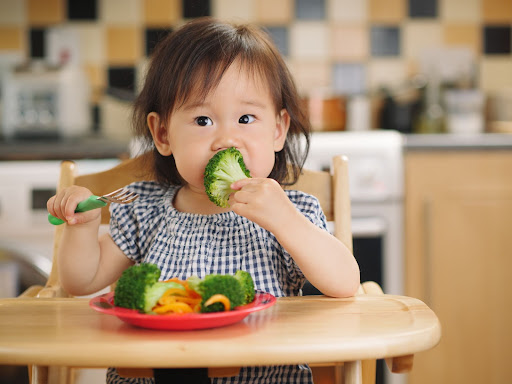The Dietary Guidelines for Americans recommend exclusive breastfeeding, meaning the infant receives only breast milk during the first six months of life for optimal nutrition and health benefits. Yet, your child will inevitably age out of this period, and you will need to begin transitioning them to solid foods. The best foods for babies are ones that are packed with essential vitamins, nutrients, and minerals.
Introducing Solid Foods
A baby’s readiness for solids depends on their own rate of development, which varies for each child. When a baby is ready to start eating solid foods, you will know by observing the following skills: sitting up with minimal support, demonstrating good head control, and bringing objects to their mouth or grasping at small objects. If your pediatrician gives you the go-ahead, keep in mind that solid foods should be supplemented with breastfeeding. Wake Forest Pediatrics has put together a list of the best foods for babies in their transition to solids.
1. Sweet Potato
Sweet potato is one of the best foods for babies starting out with solids. Even if your baby has no teeth at this stage in their development, sweet potato is a great food for them to smash the soft solids with their gums.
2. Avocado
Avocados are not only loaded with vitamins and minerals but are another great “solid” option that your baby can smash between their gums. Additionally, babies have an increased need for healthy fats in their diet, making avocados one of the best foods for babies in their transition to solids.
3. Baby Cereal
Baby cereal is normally made out of grains such as rice, oats, barley, or quinoa. These grains pose a low allergy risk making them one of the best foods for babies bridging the gap between puree and solids. Furthermore, baby cereal can be great for introducing your baby to new textures without overwhelming flavor.
4. Carrots
Carrots are packed with vitamin A, which supports the immune system, heart, lungs, and kidneys. They are also easy for babies to digest and offer a sweet yet mellow flavor. When introducing your baby to carrots, it is important to cook and cut the carrots into small pieces to avoid choking. It is important to remember that your baby gagging is normal, as they are learning to regulate the amount of food they can chew at one time.
3. Chicken
Protein is an essential nutrient in anyone’s diet, but especially for babies. Protein aids in the development of your baby’s brain, nervous system, muscles, heart, hair, and skin. Chicken not only contains protein, but also vitamins B6, B12, iron, zinc, and more. Chicken can even help promote a strong sense of taste and smell in your baby! As one of the best foods for babies, offer them roughly two tablespoons of fully cooked and cut chicken.
Foods To Avoid
There are plenty of foods for babies that are great when transitioning to solids. However, there are some you should steer clear of in the early stages. The NHS suggests steering clear of the following:
- Whole nuts and peanuts
- Raw or undercooked eggs
- Some cheeses, such as brie or bleu cheese
- Honey
- Saturated fat
- Salt and sugar
- Raw shellfish
Additionally, the American Academy of Pediatrics recommends waiting three to five days before introducing a new single-ingredient food.
Wake Forest Pediatrics is committed to providing quality care to your kids at all times on a wide array of subjects. Do you have more questions on the best foods for babies or how to introduce solid foods into their diet? Call our Wake Forest office at 919-556-4779 or our Knightdale office at 919-266-5059 to make an appointment.




